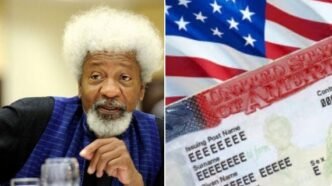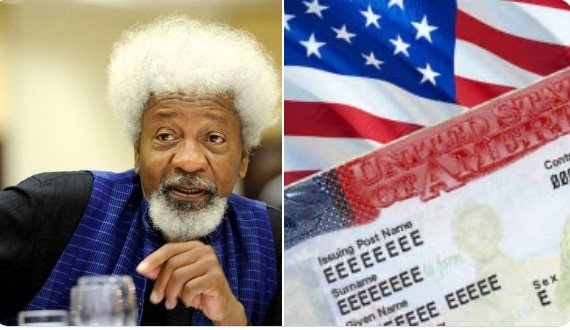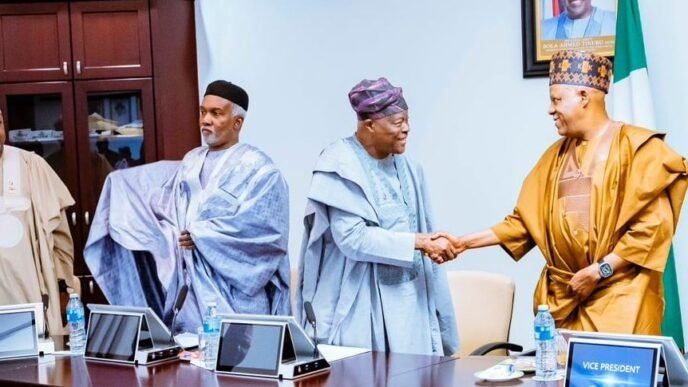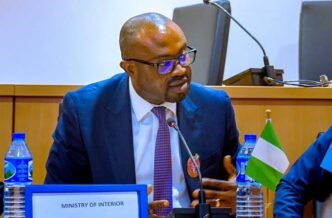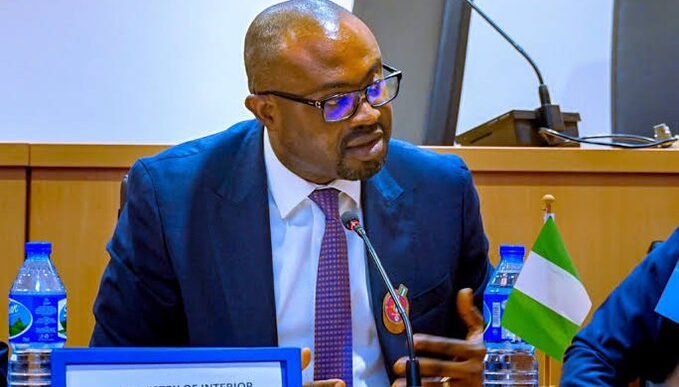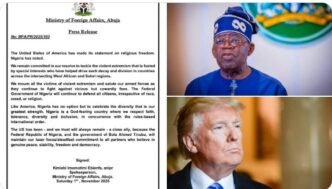Lagos — October 31, 2025
The United States government has defended its decision to revoke the visa of Nigeria’s Nobel Laureate, Professor Wole Soyinka, emphasizing that the granting of a visa to any foreign national is a privilege extended by the U.S. government — not a right.
The clarification came from the United States Consulate in Lagos on Thursday, following public outrage and widespread media discussions surrounding the unexpected withdrawal of Soyinka’s visa. The revered playwright, poet, and activist had revealed earlier in the week that his visa had been revoked without explanation.
US Consulate Reacts
In an email response to inquiries from The PUNCH on Thursday, the U.S. Mission in Nigeria stated that it could not disclose specific details of the case due to legal confidentiality restrictions under American law.
“Under U.S. law, visa records are generally confidential. We will not discuss the details of this individual visa case,” a spokesperson for the U.S. Mission in Nigeria said.
The statement reaffirmed the U.S. government’s position that visa issuance and revocation fall within the exclusive discretion of the Department of State and may be reviewed or withdrawn at any time, based on administrative or security considerations.
The U.S. government also reiterated its long-standing policy that a visa does not guarantee entry into the United States, explaining that the document merely allows a traveler to approach a port of entry, where immigration officials determine admissibility.
Soyinka’s Revelation
Professor Wole Soyinka, Africa’s first Nobel Prize winner in Literature and one of Nigeria’s most respected intellectuals, revealed the revocation during a media briefing at Kongi’s Harvest Gallery, Freedom Park, Lagos, on Tuesday.
The 90-year-old literary icon said he was taken aback by the development and had no prior notice or explanation from the U.S. authorities.
“I discovered recently that my U.S. visa has been revoked. I have no idea why or when it happened. I only found out when I attempted to make travel arrangements,” Soyinka said during the media parley.
Soyinka, who has spent decades teaching, lecturing, and participating in literary engagements across the United States, described the decision as both “surprising” and “disappointing,” though he noted that he would not contest it.
“I have no plans to challenge it. I’ve spent my life crossing borders of ideas and freedom, not merely physical borders. If one door closes, others will open,” he added.
Soyinka’s Global Standing
Born in 1934 in Abeokuta, Ogun State, Wole Soyinka remains one of Africa’s most influential voices in literature and human rights activism. He won the Nobel Prize in Literature in 1986, becoming the first African to receive the honor.
Throughout his career, Soyinka has maintained strong ties with the United States, serving as a visiting professor at several American universities, including Harvard, Yale, and Emory. He has also been a frequent speaker at international conferences, where he advocates for democracy, justice, and cultural identity.
His longstanding relationship with the U.S. makes the visa revocation particularly notable, drawing reactions from academics, human rights advocates, and political figures across Nigeria and beyond.
Reactions Trail Visa Revocation
The U.S. government’s decision has triggered heated public debate. Many Nigerians have taken to social media to express anger and disbelief, calling the move “disrespectful” to one of Africa’s most accomplished intellectuals.
Civil society groups and commentators have also weighed in, with some linking the decision to Soyinka’s recent outspoken remarks on international affairs, while others believe it might be a routine administrative action.
A Lagos-based human rights lawyer, Jiti Ogunye, criticized the revocation, calling it “regrettable and unnecessary.”
“Professor Soyinka represents intellectual courage and global integrity. The United States has the right to enforce its visa laws, but it must also be sensitive to the symbolic implications of its decisions in cases like this,” Ogunye said.
Similarly, political analyst Dr. Olisa Agbakoba described the move as “a needless embarrassment,” urging the Nigerian government to engage U.S. authorities through diplomatic channels to clarify the issue.
“This is a man who has contributed immensely to global thought and democracy. Revoking his visa without explanation undermines that relationship,” Agbakoba noted.
US Visa Law and Policy
Under U.S. immigration law, the Secretary of State has the authority to revoke or cancel any visa at any time if it is deemed that the holder no longer meets eligibility requirements.
This revocation can occur for several reasons, including administrative review, changes in policy, or information received from law enforcement or security agencies.
Experts explain that the revocation of a visa does not necessarily imply wrongdoing on the part of the holder. It can also occur as a result of a procedural update or change in diplomatic or travel regulations.
In most cases, affected individuals are not provided with detailed explanations, as U.S. law considers visa records confidential and protected under the Privacy Act.
Diplomatic and Public Implications
While the revocation has not led to any official diplomatic protest from the Nigerian government, it has raised broader questions about international travel freedoms, diplomatic reciprocity, and respect for eminent cultural figures.
A former Nigerian ambassador to the United States, Ambassador Joe Keshi, advised against overreacting, saying such actions are often administrative.
“These matters are usually technical, not personal. The U.S. has the sovereign right to issue or withdraw visas. Unless there is evidence of discrimination or political targeting, we should view it as an internal policy matter,” Keshi explained.
However, several Nigerian academics have described the move as “unfortunate” and “unnecessary,” arguing that Soyinka’s influence as a cultural ambassador has strengthened U.S.–Nigeria relations over the decades.
Professor Ngozi Uduma of the University of Ibadan’s Department of Philosophy said, “It is ironic that the United States, a country that celebrates free speech and human rights, would revoke the visa of one of the world’s greatest advocates of those values.”
Soyinka’s Response and Outlook
Despite the controversy, Soyinka has maintained his characteristic composure and humor. He told reporters that he has “many other engagements” and does not intend to allow the issue to hinder his work.
“I’m not losing sleep over this. I’ve always said that the world is large enough for ideas to flourish. There are many places to go, many people to meet, and many battles to fight for freedom and justice,” he said.
He also used the occasion to call for stronger African cultural and academic networks, stressing that “African intellectuals must build institutions and partnerships that reduce dependency on external validation or access.”
Broader Context
The incident comes amid growing global scrutiny of visa regimes and immigration policies, with countries increasingly tightening their entry requirements due to geopolitical and security concerns.
In recent years, several prominent figures — including politicians, entertainers, and academics — have had their U.S. visas delayed or revoked, often without public explanation.
Observers note that while the revocation may not have been politically motivated, the U.S. government’s handling of such cases tends to attract criticism when they involve globally respected figures like Professor Soyinka.
Conclusion
As of Thursday, the U.S. Mission in Nigeria has maintained its position of confidentiality and declined to comment further on the case. The Nigerian Ministry of Foreign Affairs has also not issued an official statement on the matter.
For now, the revocation of Wole Soyinka’s U.S. visa remains a mystery — one that underscores the tension between diplomatic discretion and public accountability.
While many view the incident as a minor administrative decision, others see it as a symbolic slight against an African icon whose legacy transcends borders.
Whatever the case, the U.S. government’s message is clear: under American law, a visa remains a privilege, not a right — even for one of the world’s most celebrated literary figures.

